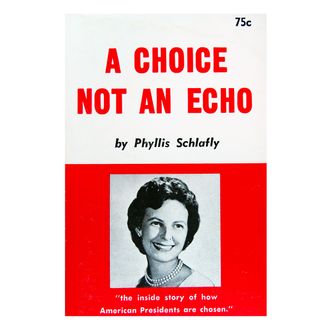
For Republicans with a sense of history, chills might have gone down their spines at this passage from a Jonathan Martin piece in the New York Times about big donors warming to Ted Cruz:
What is more striking, and will cause deep consternation among Republican strategists, is that … donors are beginning to embrace Mr. Cruz’s argument that he can win a general election by motivating core conservatives to come to the polls rather than by appealing to swing voters.
Andrew Puzder, chief executive of the conglomerate that owns Hardee’s and Carl’s Jr., supported both of Mr. Romney’s campaigns and has contributed to a number of “super PACs” and candidates this year, including Jeb Bush and Senator Marco Rubio of Florida. But after spending a couple of hours eating brisket with Mr. Cruz on Sunday at his campaign headquarters, Mr. Puzder said he was “very seriously considering” getting behind him, in part because of his appeal to the conservative base.
“I’ve become a one-issue voter,” Mr. Puzder said. “My one issue is whether somebody is going to win. My big question is: What is your path to a general election victory?”
Unhappily recalling that Mr. Romney won among self-described independents but still was soundly defeated by President Obama, Mr. Puzder said, “Part of the reason was that the base didn’t turn out to vote, and Senator Cruz understands that needs to happen.”
This is, of course, an argument a certain kind of conservative has been making for decades, back to and beyond Barry Goldwater’s 1964 campaign based on the idea of offering (to use the title of the pro-Goldwater campaign book written by a young right-wing activist named Phyllis Schlafly) “a choice, not an echo,” in repudiation of the Republican Establishment’s perpetual idea of “moving to the center” to win swing voters. The cataclysmic defeat incurred by Goldwater drove this conviction underground for a while, and even the Goldwater veteran Ronald Reagan ran a conventional swing-voter-oriented “referendum on the incumbent” campaign in 1980. This hasn’t kept his hagiographers from remembering it differently, and so there has been a regular debate within the GOP over base versus swing-voter strategies ever since. Sometimes campaigns blurred the strategies, as in 2004, when George W. Bush’s reelection effort focused to a considerable extent on base mobilization, but only after four years of careful and systematic swing-voter pandering via Karl Rove’s famous initiatives targeted to married women (No Child Left Behind), seniors (Rx Drug Benefit), and Latinos (comprehensive immigration reform) — initiatives conservatives are still deploring to this day.
Over the years many candidates have made sweet love to “the base,” only to sneak around with swing voters when the general-election campaign arrived; this is the background for the incautious comment made by Mitt Romney strategist Eric Fehrnstrom in 2012 that the campaign would apply an “Etch a Sketch” to its primary message upon winning the nomination.
But Cruz is the first viable candidate in a while who has gone wall-to-wall with a path to the nomination and an electability argument founded entirely on the theory that, when united and energized, conservatives can win the presidency on their own. Sometimes he strains his credibility even with true believers by talking of many tens of millions of conservative Evangelicals waiting to be called to arms as Christian soldiers by someone like his own self. Nonetheless, the quite factual decline in the number of swing voters and various theories of “missing white voters” have made the old-time religion of ideological mobilization tantalizing if not entirely convincing. Perhaps today’s conservatives think that a reincarnation of Barry Goldwater could win today and that the vast rollback of New Deal and early Great Society programs Goldwater demanded is still possible.
In any event, big donors and Republican Establishment opinion-leaders used to exist in order to refute such dangerous talk. If they are beginning to buy it instead, this could be a fascinating and dangerous year for the GOP even if Donald Trump is vanquished and then domesticated.






























